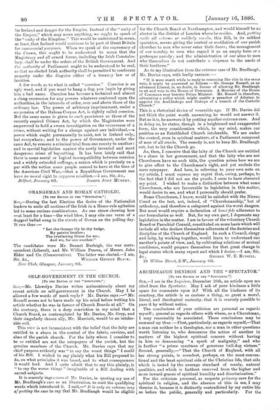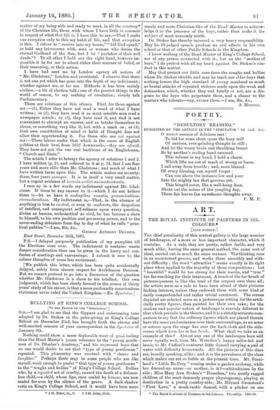ARCHDEACON DENISON AND THE "SPECTATOR."
[TO THE EDITOR OF THE "SPECTATOR."]
SIR,-I see in the Inquirer, December 26th, an article upon me cited from the Spectator. May I ask of your kindness a little space for comments upon it ? With all the kindness of its courtesy, the article is so curious a thing, so great a moral, literal, and theological curiosity, that it is scarcely possible to pass it by without notice.
The conclusions of your criticism are personal as regards myself ; general as regards others with whom, as a Churchman, I may reasonably be associated. These conclusions may be summed up thus :—First, particularly, as regards myself,—That a man can neither be a theologian, nor a man in other questions worth listening to, who denounces the action of another in matters of the highest spiritual concern without having in him so denouncing "a spark of malignity," and who is further "a prime specimen of generous bu]l-dog virtues." Second, generally,—" That the Church of England, with all her strong points, is soundest, perhaps, on the most conven- tional and the least spiritual side of the Christian life, that side which is tested by the average standard of manly, natural qualities, and which is farthest removed from the higher and more inward graces of spiritual humility and discrimination."
For the criticism personal, as respects primary care for the spiritual in religion, and the absence of this in me, I may dismiss it, because it is distinctly contradicted by my entire life as before the public, generally and particularly. For the matter of my being able and ready to meet, in all the courtesy* of the Christian life, those with whom I have little in common in respect of what that life is, I have this to say,—That I make one exception only to this my habit of life, and that exception is this. I refuse to "receive into my house," "bid God-speed," or hold any intercourse with, man or woman who denies the eternal Godhead of the Son, lest I be "partaker of their evil deeds."t To all other I hold out the right hand, however im- possible it be for me to admit either their manner of belief, or their reasoning, or their action.
I have had sent me by London agency all notices of " Mr. Gladstone," London and provincial. I observe that there is not one yet which has gone into the depth of my indictment ; whether against me, or for me. Hitherto it has been mainly surface,—a bit of election talk ; one of the poorest things in the world of reason, to say nothing of revelation ; simply talk Parliamentary.
There are solutions of this silence. First, for those against me :—(1), Either they have not read a word of what I have written ; or (2), they have read it as most sensible men read a newspaper article ; or (3), they have read it, and find it not -convenient to attempt an answer, and so betake themselves to abuse, or something very like it, but with a mask on ; or (4), their own constitution of mind or habit of thought does not allow their apprehending it For those who are not against tue :—These labour under that which is the curse of English politics at their best, from 1832 downwards,--they are afraid. They have not got the one real backbone of an Englishman, "Church and State."
The article I refer to betrays the agency of solutions 1 and 2. I have written (p. 2), and referred to it at p. 34, that I am four years and more older than Mr. Gladstone; and much of what I have written tarns upon this. The article makes me seventy- three, four years younger. It is in itself a very small matter, -but a cogent evidence of incuria critici animadvertentis.
I sum up in a few words my indictment against Mr. Glad- stone. If there be any answer to it—which I do not believe there is—let us have it ambagibus remotis, prcevaricatione, circumlocutions. My indictment is,—That, in the absence of anything in him to control, or even to moderate, the despotism of intellect, and consequent self-reliance upon every question, divine as human, ecclesiastical as civil, he has become a slave to himself, to his own position and governing power, and to the never-ending delusions from day to day of what he calls "prac- tical politics."—I am, Sir, &c., GEORGE ANTHONY DENISON. East Brent, December 30th, 18e5.
P.S.—I delayed purposely publication of my pamphlet till the Elections were over. The indictment it contains wants deeper consideration than can be given in the hurry and con- fusion of meetings and canvassings. I submit it now to the -calmer thoughts of some less excitement.
[We publish this letter, which has been quite accidentally delayed, solely from sincere respect for Archdeacon Denison. But we cannot pretend to go into a discussion of the question whether Mr. Gladstone is a slave to his intellect. Our own judgment, which has been slowly formed in the course of thirty years' study of his career, is that a more profoundly conscientious -statesman never ruled the United Kingdom.—ED. Spectator.]



































 Previous page
Previous page